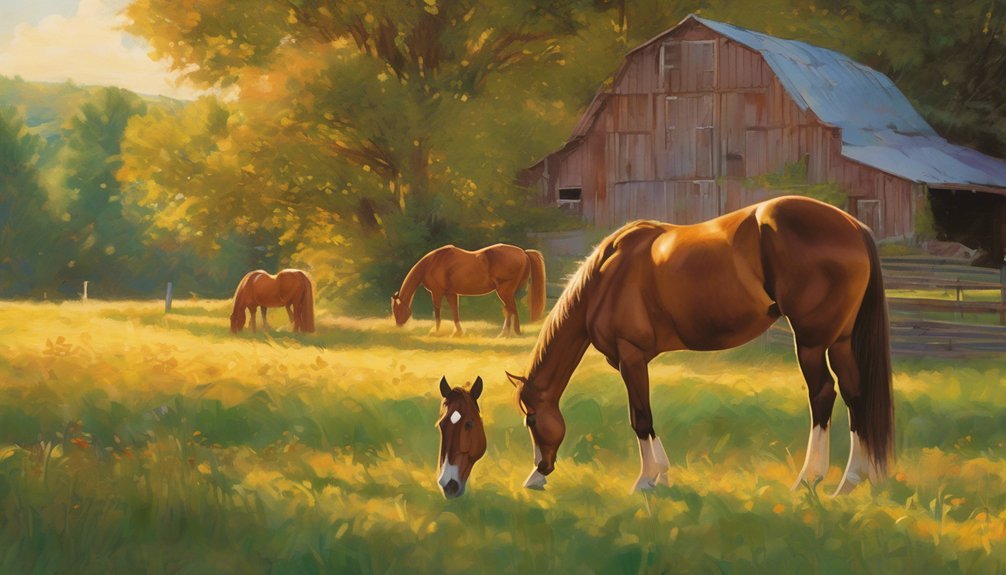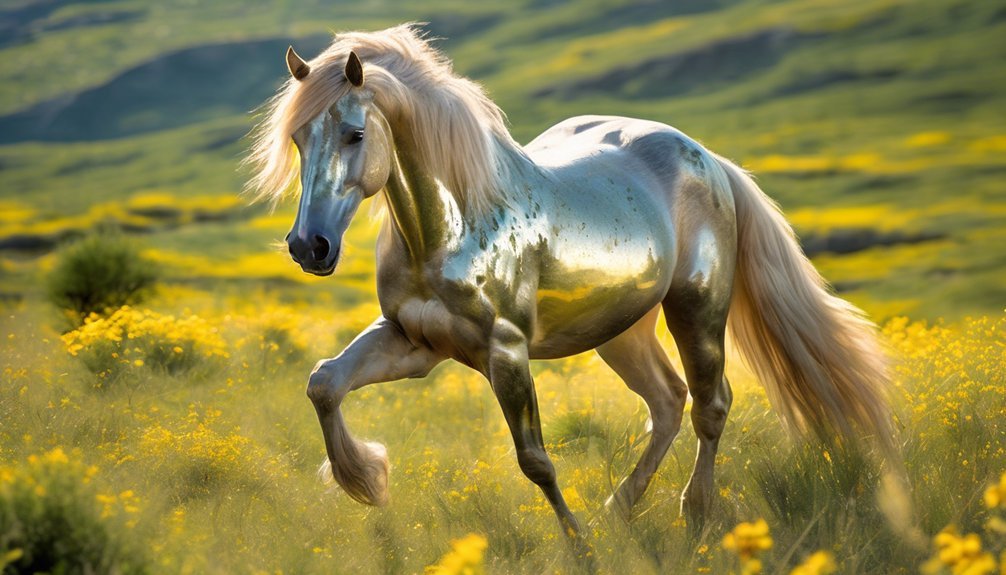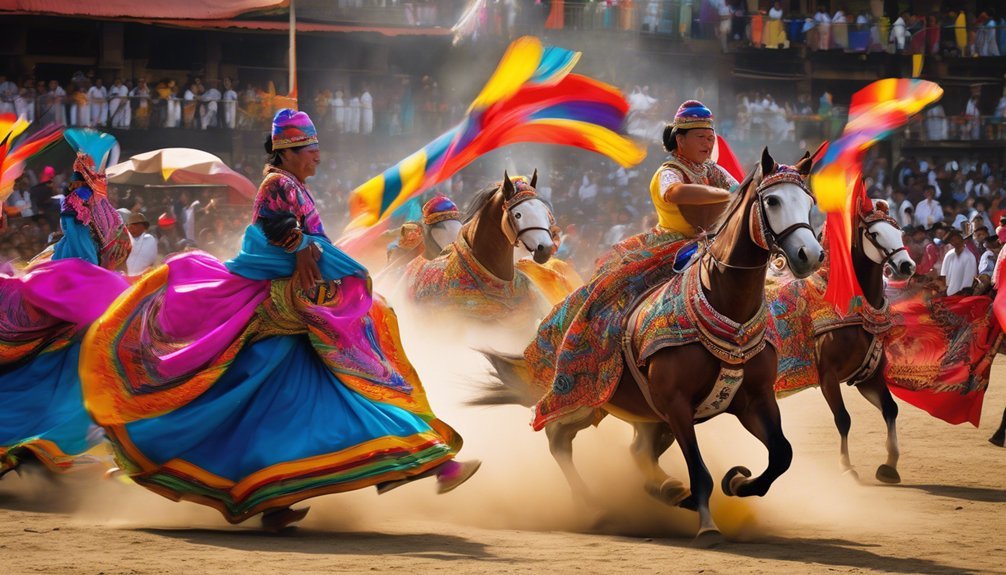
Proper horse nutrition is crucial for ensuring your horse's longevity and overall well-being. A balanced diet not only supports essential bodily functions but also plays a significant role in performance, muscle development, and immune health. By understanding the specific nutritional needs based on factors like age and activity level, you can enhance your horse's quality of life. However, many owners overlook critical aspects of equine nutrition, which can lead to serious deficiencies. What are the key components you might be missing?
Key Takeaways
- Proper nutrition enhances overall health, supporting longevity and reducing the risk of diseases in horses.
- A balanced diet provides essential nutrients that promote muscle development, energy, and immune function.
- High-fiber forage is crucial for digestive health, ensuring efficient nutrient absorption and preventing colic.
- Age-specific nutritional adjustments are necessary to meet the changing needs of horses throughout their life stages.
- Consistent hydration and balanced diets contribute to better performance and quality of life for horses.
Understanding Equine Nutritional Needs

Understanding your horse's nutritional needs is crucial for their overall health and performance. You need to consider the intricacies of equine digestion, which is designed for a high-fiber diet.
Horses have a unique digestive system that relies heavily on microbes in the hindgut to break down forage. This process is vital for optimal nutrient absorption, as it ensures your horse effectively utilizes the carbohydrates, proteins, vitamins, and minerals in their feed.
Pay attention to their specific requirements, which can vary based on age, activity level, and health status. By tailoring their diet to meet these needs, you foster a stronger, healthier horse, capable of achieving its best potential in both work and leisure.
The Role of Forage in a Horse's Diet
Forage serves as the cornerstone of a horse's diet, providing essential nutrients and fiber necessary for digestive health.
You'll find various types of forage, each with unique benefits, and assessing their quality is crucial for optimizing your horse's nutrition.
Understanding these factors will help you make informed choices that support your horse's overall well-being.
Types of Forage
While you may think of forage merely as the grass your horse munches on, it plays a crucial role in their overall health and nutrition. Different grass varieties and hay types provide essential nutrients, each influencing forage quality.
Understanding forage management, including proper forage storage techniques, can help maintain its nutritional integrity. Seasonal grazing allows your horse to benefit from fresh, diverse forage, enhancing their diet.
However, it's vital to conduct a nutritional analysis to ensure they're receiving balanced nutrients. In certain situations, forage supplements can support deficiencies.
Quality Assessment Techniques
Assessing the quality of forage is vital for ensuring your horse receives the necessary nutrients for optimal health.
Start with a visual inspection: look for vibrant color, a sweet smell, and minimal dust. These characteristics often indicate freshness.
Next, consider conducting a nutrient analysis through feed testing, which provides essential data on protein, fiber, and mineral content. This helps you tailor your horse's diet effectively.
Don't overlook the importance of moisture levels; overly wet forage can lead to mold, while overly dry can lack essential nutrients.
Regular assessments allow you to adjust your horse's feed, maintaining its overall well-being and longevity.
Forage's Nutritional Benefits
Understanding the role of forage in your horse's diet is crucial for promoting health and performance. Forage types, such as hay and pasture, provide essential fiber, which aids in digestion and supports a healthy gut.
This fiber plays a pivotal role in nutritional absorption, ensuring your horse effectively utilizes the nutrients in their feed. Moreover, forage helps maintain optimal body weight by promoting satiety, reducing the risk of overeating concentrated feeds.
It also contributes to dental health, as chewing helps wear down teeth and prevents dental issues. By prioritizing high-quality forage in your horse's diet, you can enhance overall well-being, longevity, and performance, creating a strong foundation for a happy, healthy life together.
Essential Nutrients for Optimal Health
To maintain optimal health, horses require a balanced intake of essential nutrients that support various bodily functions and overall well-being.
Achieving the right mineral balance and incorporating essential vitamins is crucial for energy production, immune function, and muscle performance.
Consider these key nutrients:
- Proteins for muscle development and repair
- Carbohydrates for energy and stamina
- Fats for healthy skin and coat
- Vitamins and minerals for bone strength and immune support
The Impact of Age on Nutritional Requirements

As your horse ages, its nutritional needs change significantly, requiring you to adjust its diet accordingly.
Younger horses typically need more energy and higher protein levels for growth, while senior horses often benefit from easily digestible fiber and increased vitamins and minerals to support overall health.
Understanding these differences is crucial for maintaining your horse's vitality throughout its life stages.
Nutritional Needs by Age
While each horse has unique nutritional needs, age plays a crucial role in shaping those requirements. Understanding how these needs change can help you provide optimal care throughout their life stages:
- Foal nutrition: High energy and protein for growth, supporting their rapid development.
- Yearling needs: Balanced minerals and vitamins to promote strong bone structure and muscle growth.
- Adult requirements: Maintenance of body condition, focusing on a well-rounded diet to support activity levels.
- Pregnant or lactating mares: Increased caloric intake and essential nutrients for both mother and foal's health.
Senior Horse Considerations
When horses reach their senior years, their nutritional needs shift significantly, requiring careful attention to maintain their health and vitality.
As they age, issues like dental health become more prominent, affecting their ability to chew and digest food properly. You'll want to consider softer feeds and high-quality forage to meet their changing needs.
Incorporating senior supplements can provide essential nutrients that support their joints, digestion, and overall well-being. Pay close attention to their weight and condition, adjusting their diet as necessary.
Regular dental check-ups are crucial to ensure they can process their food effectively.
Nutrition for Performance Horses

To optimize performance, horses require a carefully balanced diet that meets their specific energy and nutrient needs.
Performance diets play a crucial role in enhancing endurance and strength. You'll want to focus on nutrient timing, ensuring your horse receives the right nutrients at the right moments to maximize their capabilities.
Consider incorporating:
- High-quality proteins for muscle repair
- Digestible carbohydrates for sustained energy
- Essential fatty acids for optimal metabolism
- Vitamins and minerals to support overall health
Pay attention to your horse's individual requirements and adjust their diet based on their workload and performance goals.
This way, you'll not only enhance their performance but also foster a stronger bond while ensuring their long-term health and happiness.
Common Nutritional Deficiencies and Their Effects
Understanding common nutritional deficiencies is crucial for maintaining your horse's health and performance.
Vitamin deficiencies, particularly of A, D, and E, can lead to weakened immunity and poor vision. Without adequate vitamins, your horse may struggle to recover from injuries and illnesses.
Mineral imbalances, such as calcium and phosphorus ratios, can affect bone health and muscle function. An excess of one mineral can hinder the absorption of another, leading to further complications.
If your horse shows signs of lethargy, poor coat condition, or decreased appetite, it might be time to reevaluate their diet.
Regularly consulting with a veterinarian or equine nutritionist can help identify these deficiencies, ensuring your horse thrives and enjoys a longer, healthier life.
The Importance of Hydration
While many horse owners focus on feed quality and nutritional supplements, hydration often gets overlooked, yet it plays a critical role in your horse's overall health and performance.
Ensuring your horse stays hydrated is essential for their endurance, digestion, and temperature regulation.
Consider these hydration sources and strategies to keep your equine friend healthy:
- Fresh, clean water available at all times
- Electrolyte supplements during intense activity
- Soaked hay or feed to increase moisture intake
- Access to salt blocks to encourage drinking
Monitoring your horse's water consumption can reveal much about their health.
Implementing effective hydration strategies not only supports their daily activities but enhances their longevity, making every ride more enjoyable for both of you.
Tips for Creating a Balanced Diet for Your Horse

Proper hydration lays the groundwork for a horse's overall well-being, but achieving optimal health also requires a balanced diet.
Start by focusing on grain selection; choose high-quality grains that provide essential nutrients without excess sugars. Look for blends that cater to your horse's specific age, activity level, and health needs.
Next, establish a consistent feeding schedule. Horses thrive on routine, so feed them at the same times each day to promote digestive health.
Incorporate hay and fresh pasture to ensure they get enough fiber. Pay attention to their condition and adjust portions accordingly, keeping an eye on their weight and energy levels.
A little effort in these areas can lead to a healthier, happier horse for years to come.
Frequently Asked Questions
Can I Feed My Horse Table Scraps Safely?
You shouldn't feed your horse table scraps, as many human foods can harm them. Instead, consider safe alternatives like carrots or apples, which provide healthy treats without the risks associated with table scraps.
How Does Stress Affect My Horse's Nutritional Needs?
Stress impacts your horse's nutritional needs significantly. You'll need to make nutritional adjustments, increasing vitamins and minerals to support their immune system and overall health, ensuring they remain balanced and resilient during stressful times.
Are There Specific Supplements for Older Horses?
Like a wise old tree, your senior horse needs specific supplements to combat nutritional deficiencies. Look for senior horse supplements rich in vitamins, minerals, and joint support to ensure they thrive in their golden years.
What Are the Signs of Overfeeding in Horses?
You'll notice signs of overfeeding in horses through weight gain, lethargy, and a dietary imbalance. Watch for increased body condition scores and potential health issues, as these indicate your horse might be consuming too much food.
Can I Use Horse Feed for Other Animals?
While horse feed ingredients cater to specific equine dietary needs, using it for other animals can lead to nutritional imbalances. For instance, horses need 10-12% protein, whereas many livestock thrive on lower levels, highlighting potential issues.
Conclusion
In your quest to keep your horse healthy and thriving, neglecting nutrition is like expecting a top athlete to perform on fast food alone. It's ironic how many horse owners overlook the very foundation of their horse's longevity and vitality. By prioritizing a balanced diet tailored to your horse's unique needs, you'll not only enhance their performance but also ensure they enjoy a long, fulfilling life with you. After all, a well-fed horse is a happy horse.





